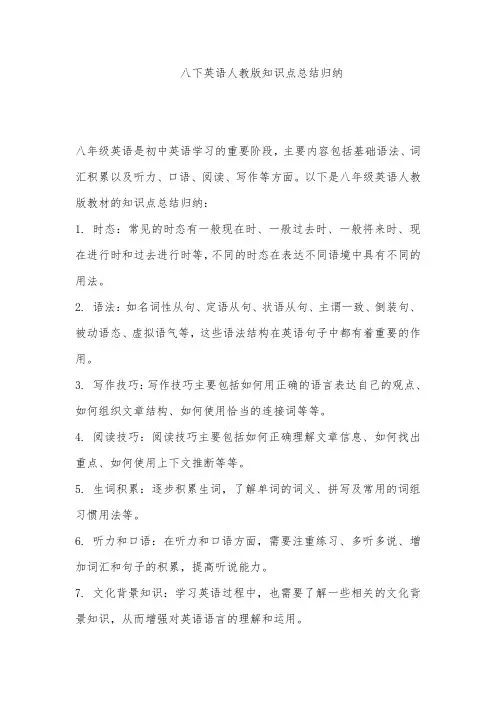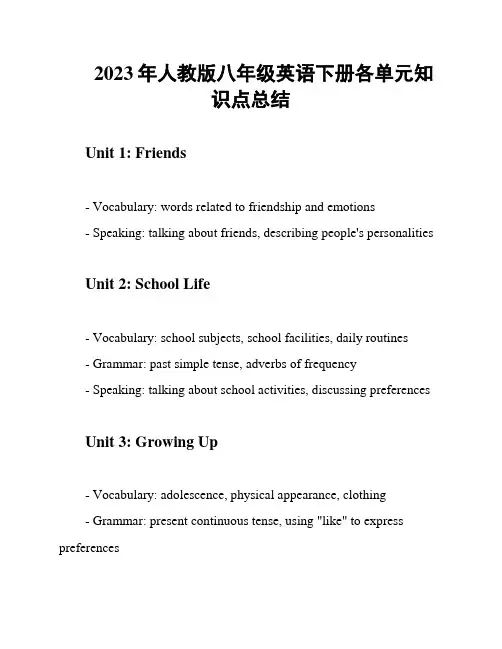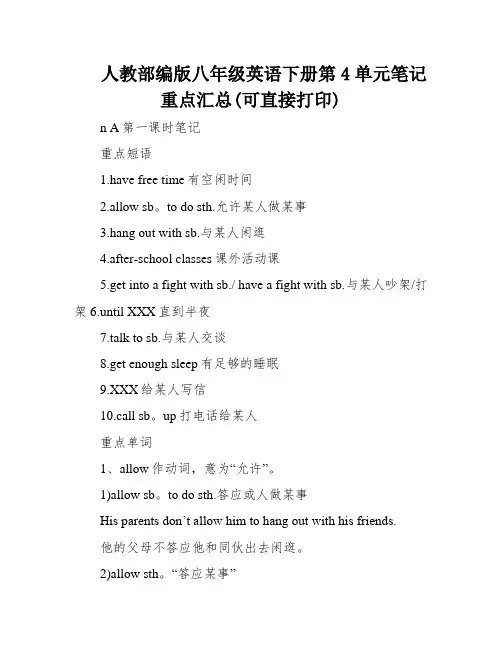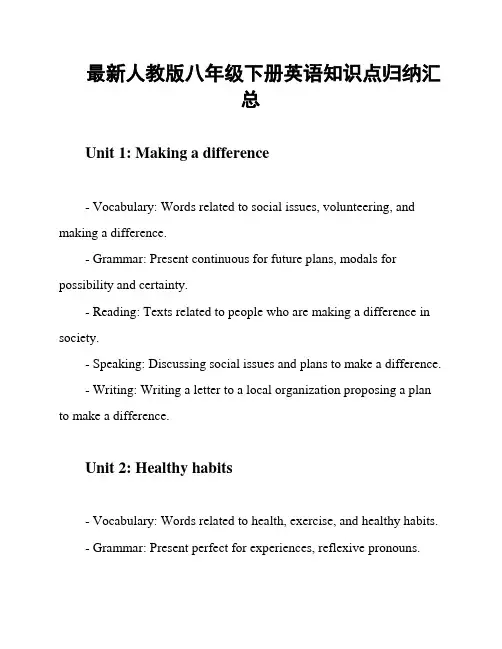人教部编版初二下册英语重点知识点梳理
- 格式:doc
- 大小:127.00 KB
- 文档页数:36

千里之行,始于足下。
人教版八年级下册英语知识点归纳总结八年级下册英语知识点归纳总结:1. 时态:包括一般现在时、一般过去时、一般将来时、现在进行时等。
2. 名词:包括可数名词和不可数名词的用法,以及名词的复数形式的构成规则。
3. 代词:包括人称代词、物主代词、反身代词、不定代词的用法及其形式变化。
4. 冠词:包括定冠词和不定冠词的用法及其形式变化。
5. 数词:包括基数词、序数词、分数词的用法。
6. 动词:包括动词的基本用法、不同类型动词的变化规则、动词时态和语态的变化等。
7. 形容词和副词:包括形容词和副词的基本用法、比较级和最高级的构成规则等。
8. 介词:包括介词的基本用法、常用的介词短语等。
9. 连词:包括并列连词、从属连词的用法及其区别。
10. 状语从句和定语从句:包括状语从句和定语从句的引导词、结构和用法。
11. 感叹句和祈使句:包括感叹句和祈使句的基本用法和句型结构。
12. 时态和语态的混合运用:包括时态和语态的混合运用,以及在不同句子结构中的变化。
13. 直接引语和间接引语:包括直接引语和间接引语的转换和用法。
14. 一般疑问句和特殊疑问句:包括一般疑问句和特殊疑问句的句型结构和用法。
15. 简单句和复合句的转换:包括把简单句转换为复合句,以及复合句的主从句关系和连接词的运用。
16. 非谓语动词的用法:包括动名词、不定式和分词的用法。
第1页/共2页锲而不舍,金石可镂。
17. 阅读理解技巧:包括提取关键信息、推理判断以及对文章的主旨和细节的理解。
以上是八年级下册英语的主要知识点归纳总结,希望对你有帮助。

八下英语人教版知识点总结归纳
八年级英语是初中英语学习的重要阶段,主要内容包括基础语法、词汇积累以及听力、口语、阅读、写作等方面。
以下是八年级英语人教版教材的知识点总结归纳:
1. 时态:常见的时态有一般现在时、一般过去时、一般将来时、现在进行时和过去进行时等,不同的时态在表达不同语境中具有不同的用法。
2. 语法:如名词性从句、定语从句、状语从句、主谓一致、倒装句、被动语态、虚拟语气等,这些语法结构在英语句子中都有着重要的作用。
3. 写作技巧:写作技巧主要包括如何用正确的语言表达自己的观点、如何组织文章结构、如何使用恰当的连接词等等。
4. 阅读技巧:阅读技巧主要包括如何正确理解文章信息、如何找出重点、如何使用上下文推断等等。
5. 生词积累:逐步积累生词,了解单词的词义、拼写及常用的词组习惯用法等。
6. 听力和口语:在听力和口语方面,需要注重练习、多听多说、增加词汇和句子的积累,提高听说能力。
7. 文化背景知识:学习英语过程中,也需要了解一些相关的文化背景知识,从而增强对英语语言的理解和运用。
总之,在学习八年级英语过程中,需要注重各个方面的综合提高,掌握基础知识,提高听、说、读、写的能力,同时也要注重培养英语思维能力和跨文化交流意识,不断拓展自己的英语视野。

2023年人教版八年级英语下册各单元知识点总结Unit 1: Friends- Vocabulary: words related to friendship and emotions- Speaking: talking about friends, describing people's personalities Unit 2: School Life- Vocabulary: school subjects, school facilities, daily routines- Grammar: past simple tense, adverbs of frequency- Speaking: talking about school activities, discussing preferences Unit 3: Growing Up- Vocabulary: adolescence, physical appearance, clothing- Grammar: present continuous tense, using "like" to express preferences- Speaking: talking about personal growth and changes, describing clothing stylesUnit 4: Hobbies and Interests- Vocabulary: hobbies, sports, leisure activities- Grammar: modal verbs (can, should), gerunds- Speaking: discussing hobbies, making suggestions, expressing likes and dislikesUnit 5: Festivals and Celebrations- Vocabulary: festivals and celebrations, traditional customs- Grammar: past continuous tense, using "must" to express necessity- Speaking: talking about festivals and celebrations, discussing traditionsUnit 6: Travel and Adventure- Vocabulary: travel and adventure vocabulary, means of transportation- Grammar: present perfect tense, prepositions of place- Speaking: discussing travel experiences, giving advice, describing placesUnit 7: Environmental Protection- Vocabulary: environmental issues, pollution and conservation terms- Grammar: passive voice, expressing cause and effect- Speaking: discussing environmental problems, proposing solutionsUnit 8: Health and Well-being- Vocabulary: health and well-being vocabulary, healthy habits- Grammar: should/shouldn't, imperatives, gerunds as subjects- Speaking: talking about healthy lifestyle choices, giving adviceUnit 9: Technology and Innovation- Vocabulary: technology-related words, inventions- Grammar: present perfect continuous tense, using "might" to express possibility- Speaking: discussing technology, its impact on society, talking about inventionsUnit 10: Literature and Culture- Vocabulary: literary terms, works of literature, cultural practices - Grammar: reported speech, connecting ideas with conjunctions- Speaking: discussing literature and culture, summarizing stories, sharing opinions注意:此文档为根据人教版八年级英语下册各单元内容总结的知识点文档,建议学生们在学习过程中参考课本内容来加深理解。

人教版八年级英语下册各知识点归纳总结Knowledge Summary of People's Education Edition Eighth Grade English TextbookUnit 1 Dream JobsIn this unit, students learn about different occupations and career paths. They practice talking about their dream jobs and discussing the pros and cons of different professions. Vocabulary includes words related to jobs, such as lawyer, engineer, chef, etc. Grammar points include the present simple tense for expressing routines and habits, as well as future forms for talking about future plans.Unit 2 Healthy EatingThis unit focuses on the importance of a balanced diet and healthy eating habits. Students learn about different food groups, nutrients, and the benefits of eating a variety of foods. Vocabulary includes words related to food, such as carbohydrates, proteins, vitamins, etc. Grammar points include using countable and uncountable nouns, as well as quantifiers such as some, any, much, and many.Unit 3 Travel PlansIn this unit, students learn how to talk about their travel plans and experiences. They practice using travel vocabulary and expressions, as well as giving recommendations for places to visit. Vocabulary includes words related to travel, such as destination, itinerary, accommodation, etc. Grammar points include present perfect tense for talking about past experiences and future forms for making predictions and plans.Unit 4 Environmental ProtectionThis unit focuses on the importance of protecting the environment and taking action to preserve natural resources. Students learn about environmental issues and discuss ways to reduce waste and pollution. Vocabulary includes words related to the environment, such as recycling, renewable energy, pollution, etc. Grammar points include modals of obligation and necessity for giving advice and making suggestions.Unit 5 Festivals around the WorldIn this unit, students learn about different festivals and celebrations from around the world. They practice talking about cultural traditions, customs, and rituals. Vocabulary includes words related to festivals, such as celebrations, traditions, customs, etc. Grammar points include using the present perfecttense to talk about past experiences and cultural differences in expressing gratitude and apologies.Overall, the eighth grade English textbook covers a wide range of topics and language skills, including vocabulary, grammar, speaking, listening, reading, and writing. Students are exposed to a variety of real-life situations and authentic materials to help them develop their language proficiency and communication skills. By the end of the school year, students should feel more confident and competent in using English in different contexts and situations.。

人教版初中英语初二下全册分单元要点小结人教版初中英语初二下全册单元要点小结Unit 15 What do people eat?单元小结简单句的五种基本句型1. 主语+谓语(不及物动词) [S + V]如:The children are playing happily.孩子们正在高兴地玩。
2. 主语+谓语(及物动词)+宾语 [S+V+O]如:The Greens enjoy living in China.格林一家喜欢住在中国。
3. 主语+谓语+表语 [S+V+P]该句型谓语动词为连系动词。
常见的系动词有:be(是);get(变得), become(成为), turn(变得), look(看起来), feel(感到), smell(闻起来), taste(尝起来), sound(听起来), seem(似乎) 等。
如:① He became a famous doctor.他成为了一名著名的医生。
② The apple pie ta stes really delicious.苹果派吃起来真是好吃。
4. 主语+谓语+间接宾语+直接宾语 [S+V+InO+DO]这种句型中的及物动词后跟双宾语,既指人的间接宾语和指物的直接宾语。
也可以把间接宾语放在直接宾语之后,但要加介词for或to。
如:① My aunt bought me a computer. = My aunt bought a computer for me. 我阿姨买给我一台电脑。
② I passed him the salt. = I passed the salt to him.我把盐递给他。
5. 主语+谓语+宾语+宾语补足语 [S+V+O+OC]如:We must keep our school clean.我们必须保持我们的学校清洁。
Unit 16单元小结情态动词can的用法情态动词can只有:can和过去式could两种形式,后面跟动词原形,用于一切人称和单、复数。

2023年最新人教版八年级英语下册知识点总结归纳Unit 1: Making a Difference- Vocabulary: words related to making a difference- Grammar: present continuous for future actions, imperative sentences for giving instructions- Listening: a conversation about volunteering- Speaking: discussing ways to make a differenceUnit 2: Learning English- Vocabulary: words related to learning English- Grammar: simple present tense, present continuous tense- Reading: a passage about learning English effectively- Listening: a conversation about language learning strategies- Speaking: describing language learning experiencesUnit 3: A Taste of English Humor- Vocabulary: words related to English humor- Reading: jokes and humorous stories in English- Speaking: sharing funny experiences and telling jokesUnit 4: The Power of Nature- Vocabulary: words related to natural disasters- Grammar: present perfect tense, the passive voice- Reading: articles about natural disasters and their effects- Listening: news reports about recent natural disasters- Speaking: discussing ways to protect the environment...(Continue summarizing the content of the remaining units in a similar format)...ConclusionThis summary provides an overview of the key knowledge points covered in the 2023 edition of People's Education Press' Grade 8 English textbook. Each unit focuses on different topics, vocabulary, grammar, reading, listening, and speaking skills. By studying these units, students can strengthen their English language proficiency and broaden their understanding of various subjects.。

人教版八年级英语下册知识点最新归纳 以下是人教版八年级英语下册的知识点最新归纳: Unit 1: Why don't you join us? - 动词-ing形式的用法 - 为某人提建议的方式:Why don't you...? / You should... - 物品描述 - 情感类形容词的用法:interesting, exciting, relaxing, disappointing等
Unit 2: I think that mooncakes are delicious. - 肯定观点的表达 - 对某事物的看法和观点 - 物品描述:taste delicious, smell good, sound interesting, look beautiful等 - 定语从句的用法:who, which, that
Unit 3: What were you doing when the rainstorm came? - 过去进行时的用法 - 过去发生的事件、动作和状态 - 时钟时间的表达
Unit 4: I used to be afraid of the dark. - used to的用法 - 过去习惯、经历的表达 - 人物特点和个性描述:brave, friendly, kind, patient等 Unit 5: It must belong to Carla. - must的用法和推测 - 对现在情况的推测 - 物体归属的推测 - 预见未来的情况 - 情感的表达:disappointed, excited, worried, surprised等
Unit 6: I'm going to study computer science. - 将来时态的用法 - 对未来计划和打算的表达 - 不同学科和专业的介绍:maths, English, science, history等

千里之行,始于足下。
人教版八班级下册英语学问点归纳总结八班级下册英语学问点归纳总结:一、时态的运用:1. 一般现在时:表示经常性的动作、习惯、真理、客观事实等。
2. 一般过去时:表示过去某个时间发生的动作或存在的状态。
3. 一般将来时:表示将要发生的动作。
4. 现在进行时:表示现在正在进行或临时的动作。
5. 过去进行时:表示过去某个时间正在进行的动作。
6. 将来进行时:表示将来某个时间正在进行的动作。
7. 现在完成时:表示过去某个时间开头,持续至今的动作或状态。
8. 过去完成时:表示过去某个时间之前的动作或状态。
二、被动语态的构成:被动语态由“助动词be + 及物动词的过去分词”构成。
被动语态要留意时态全都。
三、虚拟语气的运用:1. 与现在事实相反:If + 主语 + were,主语 + should/ would/ could + do。
If + were to + 动词原形,主语 + should/ would/ could + do。
例如:If I were you, I would study harder.If it were to rain tomorrow, we should stay at home.2. 与过去事实相反:If + 主语 + had + 过去分词,主语 + should/ would/ could + have + 过去分词。
第1页/共3页锲而不舍,金石可镂。
If + 主语 + had + 过去分词,主语 + should/ would/ could + have + done。
例如:If I had seen her, I would have spoken to her.If I had known, I would have helped you.四、名词的全部格的构成:一般状况下,单数名词在尾部加’s构成全部格;复数名词以s结尾在尾部加’构成全部格,以s结尾的复数名词在尾部加’。

最全面人教版八年级下册英语各单元知识点总复习归纳总结Unit 1 How often do you exercise?词汇1. frequently 经常地2. hardly 几乎不3. ever 曾经4. once in a while 时不时5. rarely 很少语法一般现在时1. 频率副词放在动词前:I always read newspapers.2. 否定句用don't或doesn't+动词原形:I don't watch TV every day.3. 疑问句用do或does+主语+动词原形:Do you play soccer every week?Unit 2 I used to be afraid of the dark.词汇1. used to 过去常常2. get over 克服3. nervous 紧张的4. confident 有信心的5. stage 舞台语法1. Be used to+动名词表示惯或适应,I am used to studying English at night.2. Used to+动词原形表示过去常常,I used to read books every day.3. Get over+名词/代词/动名词,表示克服,She got over the flu last week.Unit 3 Could you please tell me where the restaurants are?词汇1. instruction 说明2. turn right/left 向右/左转3. excuse me 对不起4. straight 直走5. opposite 对面语法1. Could you please/could/may I+动词原形,请求礼貌地做事,Could you please help me with my English?2. Would like+名词 / 动名词,表示想要做某事,I would like to go shopping with you.3. May I ask+句子,礼貌地询问某事,May I ask where the restroom is?Unit 4 Why don't you talk to your parents?词汇1. conversation 对话2. listener 听众3. honest 诚实的4. conversation starter 聊天开场白5. effective 有效的语法1. How about/What about+动名词/名词,表示建议和提议,What about watching a movie?2. Why not+动词原形,表示建议和提议,Why not go swimming?3. Let's+动词原形,表示建议和提议,Let's have a party on the weekend.Unit 5 It must belong to Carla.词汇1. sweater 毛衣2. by accident 偶然地3. honest 诚实的4. lose 丢失5. owner 拥有者语法1. Can/Can't+动词原形,表示能力或可能性,I can dance.2. Must/Mustn't+动词原形,表示肯定或否定的推断,She must be the new teacher.3. Have/Has to+动词原形,表示必须做的事情,I have to finish my homework first.词汇1. graduate 毕业生2. physics 物理学3. ambitious 有抱负的4. career 职业5. education 教育语法一般将来时1. be going to+动词原形,表示打算做某事,I am going to see a film tonight.3. be + going to+现在进行时,表示不久会发生的事情,They are going to sing a song later.Unit 7 How do you make a banana milk shake?词汇1. recipe 食谱2. whip 打(奶油)3. peel 去皮4. slice 切片5. pour 倒语法1. What/How/Which+系动词+主语+谓语,表示特定的主语或具体的内容。

人教部编版八年级英语下册第4单元笔记重点汇总(可直接打印)n A第一课时笔记重点短语1.have free time有空闲时间2.allow sb。
to do sth.允许某人做某事3.hang out with sb.与某人闲逛4.after-school classes课外活动课5.get into a fight with sb./ have a fight with sb.与某人吵架/打架6.until XXX直到半夜7.talk to sb.与某人交谈8.get enough sleep有足够的睡眠9.XXX给某人写信10.call sb。
up打电话给某人重点单词1、allow作动词,意为“允许”。
1)allow sb。
to do sth.答应或人做某事His parents don’t allow him to hang out with his friends.他的父母不答应他和同伙出去闲逛。
2)allow sth。
“答应某事”I don't think she will allow it.我想她不会允许这件事情。
3)allow XXX.“允许做某事”XXX.在我们家不允许抽烟。
4)XXX.“被答应做某事”Passengers are not allowed to smoke on the bus.在公交车上,乘客不允许抽烟。
2、XXX.发觉或人在做某事其中的doing(现在分词)作宾语补足语。
类似的还有: XXX。
意为“看到/窥察到XXX听到XXX留意到XXX觉得或人在做某事”。
3、词语辨析:太多:too much+不可数名词例:too much homework太多功课太多:too many +可数名词复数例:too many people太多人太:much too+副词或形容词例:much too salty太咸重点句型1、What’s wrong with。
意为“……怎样了?”相当于What’s the matter with。

最新人教版八年级下册英语知识点归纳汇总Unit 1: Making a difference- Vocabulary: Words related to social issues, volunteering, and making a difference.- Grammar: Present continuous for future plans, modals for possibility and certainty.- Reading: Texts related to people who are making a difference in society.- Speaking: Discussing social issues and plans to make a difference.- Writing: Writing a letter to a local organization proposing a plan to make a difference.Unit 2: Healthy habits- Vocabulary: Words related to health, exercise, and healthy habits.- Grammar: Present perfect for experiences, reflexive pronouns.- Reading: Texts related to healthy lifestyle choices and their benefits.- Speaking: Talking about personal experiences and giving advice on maintaining a healthy lifestyle.- Writing: Writing an article about the importance of healthy habits.Unit 3: The media- Vocabulary: Words related to different forms of media, sources of news, and media literacy.- Grammar: Passive voice, reported speech.- Reading: Texts about the role of media in society and fake news.- Speaking: Discussing the influence of media and analyzing news articles.- Writing: Writing a blog post about media literacy and ways to identify fake news.Unit 4: Our world- Vocabulary: Words related to environmental issues, climate change, and sustainable practices.- Reading: Texts about environmental problems and solutions.- Speaking: Discussing environmental issues and debating possible solutions.- Writing: Writing a persuasive essay on the importance of protecting the environment.Unit 5: Science and technology- Vocabulary: Words related to scientific discoveries, technological advancements, and the impact of technology.- Grammar: Future forms, expressing intention and prediction.- Reading: Texts about scientific breakthroughs and the pros and cons of technology.- Speaking: Talking about future inventions and the benefits of technology.- Writing: Writing a report on the impact of technology on society.Unit 6: Incredible journeys- Vocabulary: Words related to travel, transportation, and famous landmarks.- Grammar: Past continuous and past simple, concessive clauses.- Reading: Texts about famous journeys and travel experiences.- Speaking: Talking about personal travel experiences and discussing dream destinations.- Writing: Writing a travel blog post about an incredible journey.Unit 7: History and culture- Vocabulary: Words related to historical events, famous figures, and cultural traditions.- Grammar: Present perfect continuous, expressing duration.- Reading: Texts about historical events and cultural practices.- Speaking: Discussing famous historical figures and traditional customs.- Writing: Writing an interview with a historical figure.Unit 8: Incredible sports- Vocabulary: Words related to different sports, sportsmanship, and sports events.- Grammar: Should have, expressing regret.- Reading: Texts about incredible sports achievements and sportsmanship.- Speaking: Talking about favorite sports and discussing sportsmanship.- Writing: Writing a letter to a professional athlete expressing admiration.Unit 9: Career choices- Vocabulary: Words related to different professions, skills, and job interviews.- Grammar: Conditional sentences, expressing preferences.- Reading: Texts about different career choices and skills required for specific jobs.- Speaking: Discussing future career paths and giving advice on job interviews.- Writing: Writing a career development plan outlining career goals and necessary steps.Unit 10: Making connections- Grammar: Indirect questions, expressing purpose.- Writing: Writing an email to a friend inviting them to join a language exchange program.Unit 11: Beyond borders- Vocabulary: Words related to countries, nationalities, and cultural diversity.- Grammar: Relative clauses, expressing possession.- Reading: Texts about different countries, their cultures, and customs.- Speaking: Talking about cultural differences and similarities.。
人教版英语八年级下册知识点总结一、语法知识点1. 时态:掌握一般现在时、一般过去时、一般将来时、现在进行时、过去进行时、过去将来时等时态的用法。
2. 过去进行时:用于表示过去某一时间正在进行的动作或状态。
3. 以下代词和副词的用法:- somebody, anybody, nobody, everybody 可用作主语或宾语。
- something, anything, nothing, everything 可用作主语或宾语。
- somewhere, anywhere, nowhere, everywhere 可用作地点副词。
4. 句型:掌握各种基本句型,如祈使句、选择疑问句、反义疑问句等。
5. 状语从句:掌握时间、原因、结果、条件等类型的状语从句的用法,并注意从句的引导词。
6. 定语从句:研究使用关系代词 who, whom, whose, which, that 引导定语从句,并了解先行词和关系词在从句中的作用关系。
二、词汇知识点1. 词汇拼写和用法:巩固和扩大基础词汇量,掌握词汇的正确拼写和用法。
2. 同义词和反义词:研究常用的同义词和反义词,提高词汇表达的能力。
3. 词组和固定搭配:掌握常用的词组和固定搭配,能够灵活运用。
三、阅读知识点1. 阅读理解:提高阅读理解能力,掌握快速获取信息的技巧。
2. 阅读策略:研究使用各种阅读策略,如扫读、略读、详读、推断等。
3. 阅读技巧:培养良好的阅读惯和技巧,如划重点、标记陌生单词等。
四、写作知识点1. 写作结构和组织:研究写作时合理安排文章结构和组织思路,使内容连贯。
2. 信息衔接和过渡:掌握信息衔接和过渡的方法,使文章各部分之间有逻辑性。
3. 词汇和句型运用:运用丰富的词汇和多样的句型,提高写作表达的准确性和流畅性。
以上为人教版英语八年级下册的主要知识点总结,希望能帮到你!。
Grammar focus 笔记when与while的区别(短暂性动词): 表示不能延续的动作,发生后立即结束。
如:come,go,arrive,borrow,lend,open,begin,finish,get等等。
延续性动词:表示能够延续的动作,这种动作可以延续下去并产生持久影响。
如:play,sleep,read,talk,do,wait,stay,rain,keep, learn等等。
when既指时间点,也指一段时间,后面跟延续性动词或非延续性动词(短暂性动词)。
例:It was raining hard when we arrived.(短暂性动词)the telephone rang.while只指一段时间①后面只能用延续性动词,“当…时候”,如后面接的动词是进行时态,则用while多于when, when常与短暂性动词或延续性动词不强的动词连用。
②表示的动作通常与主句的动作同时发生。
③可以连接两个并列句子,还可以表示对比关系,意为:然而。
例:I like singing while she likes dancing.④n. 意为:一段时间,一会儿。
例: I stayed there for a short while. 我在那呆了一小会儿即: when+一般过去式,过去进行时while + 过去进行时过去进行时+while+过去进行时1、buy a drink 买饮料2、take the car to the car wash 把车开到洗车场3、wake up 叫醒;醒来,代词做宾语放中间wake him up 叫醒他 wake的过去式:woke4、right away = at once = in a minute 立刻;马上5、have a look 看一看have a look at sth.= look at sth.6、be in bad shape 变形7、hit a tree 撞到树上 hit -hit-hit 现在分词 hitting8、icy adj.结冰的, ice n. 冰9、kid: n.小孩子可数,复数kids, a kid --- many kids v.开玩笑 You’re kidding! 你在开玩笑吧!10、in times of ... 在......时期/时候in times of difficulty 在困难时期11.the place of the accident 事故发生地12.heavy rain/ snow 大雨 / 大雪rain / snow heavily 雨 / 雪下得大13.die down die away die out逐渐消失/变弱减弱,消失,渐熄灭绝,消失。
千里之行,始于足下。
202X年人教版八年级下册英语知识点总结以下是202X年人教版八年级下册英语知识点的总结:
1. 语法知识点:
- 过去进行时:was/were + 动词-ing
- 动词不定式:to + 动词原形
- 被动语态:be + 过去分词
- 直接引语和间接引语的转换
- 名词性从句和宾语从句
- 定语从句和状语从句
- 虚拟语气的使用
- 感叹句的构造和使用
- 并列连词和从属连词的用法
- 省略句的构造和使用
- 形容词比较级和最高级
2. 词汇知识点:
- 同义词和反义词
- 词组和固定搭配
- 常用短语和习惯用语
- 数词和数量词
- 形容词和副词
3. 阅读技巧:
- 推测词义
- 推理推断
- 主旨理解
第1页/共2页
锲而不舍,金石可镂。
- 细节理解
- 文章结构分析
- 语篇连贯分析
4. 写作技巧:
- 句型多样化
- 表达清晰连贯
- 使用丰富的词汇
- 结构完整的文章
以上就是202X年人教版八年级下册英语知识点的总结。
希望对你有帮助!。
英语知识点Unit 1 What’s the matter?一、重点短语1. have a fever 发烧2. have a cough 咳嗽3. have a toothache 牙疼4. talk too much 说得太多5. drink enough water喝足够的水6. have a cold 受凉;感冒7. have a stomachache 胃疼8. have a sore back 背疼9. have a sore throat 喉咙痛10. lie down and rest 躺下来休息11. hot tea w ith honey 加蜂蜜的热茶12. see a dentist 看牙医13. get an X-ray 拍X 光片14. take one’ s temperature 量体温15. put some medicine on sth. 在……上面敷药16. feel very hot 感到很热17. sound like 听起来像18. all weekend 整个周末19. in the same way ? 以同样的方式20. go to a doctor 看医生21. go along 沿着……走22. on the side of the road 在马路边23. shout for help 大声呼救24. without th inking twice 没有多想25. get off 下车26. have a heart problem 有心脏病27. to one’ s surprise 使.......二、重点句型1. What’ s the matter? What’ s the matter with you? = What’s the trouble with you? = What’ s wrong with you?你怎么了2. W hat should she do?她该怎么办呢?Should I take my temperature?我应该量一下体温吗?主语+ should/shouldn’t + 动词原形. ..①You should lie down and rest.你应该躺下休息一会儿。
人教版八年级下册英语知识点总结八年级下册人教版英语知识点总结人教版八年级下册英语知识点主要包括语法知识、单词与短语、句型转换、阅读理解、听力理解等方面的内容。
下面就逐个知识点进行总结。
一、语法知识1. 时态的用法:包括一般现在时、一般过去时、一般将来时、现在进行时、过去进行时、过去将来时、现在完成时、过去完成时、将来完成时等。
2. 常用的非谓语动词:- 不定式:to do- 动名词:doing- 现在分词:doing- 过去分词:done3. 定语从句的结构:主语从句、表语从句、宾语从句、定语从句等。
4. 直接引语和间接引语的转换:可以通过恰当的词语连接或改变动词形式进行转换。
5. 复合句的连接词:包括并列连词、从属连词、状语从句连接词等。
二、单词与短语1. 数词与序数词:如one, two, three等,以及first, second, third 等。
2. 表示时间的词汇:如时钟时间(o'clock), 小时(hour), 分钟(minute), 星期(week), 日期(date), 月份(month)等。
3. 学科与科目:包括数学(maths),物理(physics),化学(chemistry),历史(history),地理(geography)等。
4. 动物:如狗(dog),猫(cat),鸟(bird),鱼(fish),狼(wolf)等。
5. 天气与季节:如晴天(sunny),雨天(rainy),多云(cloudy),下雪(snowy),春天(spring),夏天(summer),秋天(autumn),冬天(winter)等。
三、句型转换1. 一般疑问句与肯定句:通过改变句序或加上助动词进行转换。
2. 否定句与肯定句:通过在动词前加上not或助动词即可。
3. 特殊疑问句与句子:通过疑问词来引导句子。
四、阅读理解1. 短文填空:根据短文内容和上下文的逻辑关系填写合适的单词。
2. 选择题:根据短文内容选择最佳答案。
八年级下英语知识点归纳总结一、语法1. 综合运用一般现在时态和现在进行时态例:He usually goes swimming on weekends.(一般现在时) They are playing basketball in the playground.(现在进行时)2. 一般过去时态的句型转换例:They practiced English yesterday.(一般过去时)Did they practice English yesterday?(一般过去时疑问句)3. 使用比较级和最高级形容词例:The Great Wall is longer than the Yellow River.(比较级) Mount Everest is the highest mount本人n in the world.(最高级)4. 定语从句的引导词例:The girl who is wearing a red dress is my sister.(关系代词who)5. 被动语态构成例:The book was written by Mark Tw本人n.(被动语态)6. 用于表示条件的if引导的句子例:If it r本人ns tomorrow, we won't go on the trip.(条件句)7. 情态动词的用法例:We can swim in the pool.(can表示能力)You may watch TV after finishing your homework.(may表示允许)二、词汇1. 动词短语及其搭配例:give up, look forward to, pick up, make up, put off2. 形容词及其常见搭配例:beautiful scenery, delicious food, interesting story, exciting experience3. 介词短语及其搭配例:in front of, on the left, at the back of, by the side of4. 常见短语搭配例:as soon as possible, take care of, go for a walk, have a good time, make a decision5. 重点词汇梳理例:traffic, environment, education, pollution, adventure, emergency三、阅读1. 阅读理解题型解题技巧例:根据文章中的关键词快速定位答案,理解文章的主题和中心思想2. 阅读短文情景交际练习例:短文中的交际用语练习,如购物、问路、介绍自己等3. 阅读材料分析例:文章的结构、段落主题、中心思想等方面的分析四、写作1. 短文写作技巧例:如何表达个人看法、想法、感受等2. 书信写作例:如何用英语写一封建议信、感谢信、道歉信等3. 日记写作例:如何用英语记录每日生活、学习、感悟等五、口语1. 日常用语表达例:问候语、感谢语、道歉语等2. 语音语调练习例:练习正确的发音、语音语调3. 口语练习场景例:购物、问路、旅游、介绍自己等情景练习以上是八年级下英语知识点的归纳总结,希望同学们能够在学习中加强对这些知识点的掌握,提高英语水平,取得更好的成绩。
- 1 -
人教部编版初二下册英语重点知识点梳理
Unit 5 Topic 1
【重点词组】
1. invite sb. to do sth. 邀请某人做某事
2.one of +形容词最高级+ 名词复数
3. say thanks/hello/sorry/good-bye to sb.
向某人致谢/问好/道歉/告别
4. feel/taste/smell/look/sound/seem +adj.
5. seem to do sth.
seem+adj.
it seems that+从句
6. a ticket for/to sth.一张……的票
7. lonely adj.孤独的
alone adj./adv.独自的,一个人的
8. because of+n./pron/v-ing 因为,由于
9. cheer sb. up使某人振作起来
10. care for =take care of = look after照顾
11. come into being 形成,产生
12. be full of = be filled with充满……
13. agree with sb.同意某人
- 2 -
14. make peace with sb.与某人和平相处
15. in the end =at last = finally最后,最终
16. be popular with sb.受某人欢迎
【词形变化】
1.invite v.邀请
invitation n.邀请
2.disappionted adj.失望的,沮丧的
disappointment n.失望,沮丧
disappoint v.使失望
3.excite v.使激动,使兴奋
excited adj.兴奋的,激动的(修饰人)
exciting adj.令人兴奋的,使人激动的(修饰物)
4.main adj.主要的
mainly adv.主要地
5.face n.脸,面部
facial adj.面部的
6.worry v.担心
worried adj.担心的,担忧的
【重点句型】
1.--How are you doing?你好吗?
--Very well.非常好。
2.What a pity!多么遗憾呀!
- 3 -
3.—How do the flowers smell?
--They smell nice.
--花闻起来怎么样?
--很好。
4.He seems a little unhappy.
他似乎有点不开心。
5.How did the music sound?
音乐听起来怎么样?
6.Please say thanks to your mom for us.
请代我向你的妈妈致谢。
Unit 5 Topic 2
【重点短语】
1.do badly in=be bad at在某方面做的差
2.be strict with sb.对某人要求严格
3.have a talk with sb.与某人交谈
4.be worried about=worry about担心……
5.take it easy放松点,别紧张
6.fail the English exam英语考试不及格
7.fail to do sth.失败做某事
8.at one’s age 在某人这个年龄时
9.tell jokes 讲笑话
10.sb. find/think it+adj. to do sth.
- 4 -
某人认为/发现做某事是……
11.be kind/friendly to sb.对某人友好
12. wish to do sth./hope to do sth.希望做某事
wish sb. to do sth.希望某人做某事
sb. wish/hope that...某人希望……
13.what’s more 而且
14.that替代前面所提到可数名词单数或不可数名词
those替代前面所提到可数名词的复数
15.be afraid of doing sth.
be afraid to do sth.害怕做某事
16.as+adj/adv.(原级)+as 和……一样
not as/so…as (as…as否定形式)
17.make faces 做鬼脸
18.refuse to do sth. 拒绝做某事
19.deal with
do with 处理,解决
20.go to the movies 去看电影
21.no longer=not…any longer不再……
22.though/even though
虽然,尽管(不能和but连用,但可与still,yet连用)
23.be/get used to doing sth.习惯于做某事
used to do sth.习惯于做某事
- 5 -
【词形变化】
1.sad adj. 伤心的,悲伤的
sadly adv,
sadness n
2.almost/nearly adv.几乎,差不多
3. fair adj. 公平的
unfair adj,不公平的
4.use v./n 使用/用途
useful adj. 有用的
useless adj. 无用的
5.usual adj.通常的,平常的
usually adv.通常
6.love v.爱,热爱
lovely adj.可爱的
7.help v.帮助
helpful adj.有用的,有益的
【重点句型】
1. I’m sorry/glad to hear that.
听到这我很难过/高兴。
2. What seems to be the problem?
出了什么问题?
3. Thank you for telling me.
- 6 -
谢谢你告诉我。
4. --How are you feeling today?
你今天感觉怎么样?
5. I’m feeling better now.
我现在感觉好多了。
6. I’m feeling really sad because I failed the English
exam.
我感觉真的很伤心因为我英语考试不及格。
7. Why don’t you talk to someone when you feel sad?
当你伤心的时候为什么不和某人交谈下呢?
8. Who do you want to make friends with?
你想和谁交朋友?
9. There, there! It will be OK.
好了,好了!一切都会好起来的。
10. Are you OK today?
你今天好吗?
11. I find it difficult to learn English well.
我发现把英语学好很难。
12. Don’t worry, I’ll help you with it.
别担心,我会帮助你的。
13. You’re so kind to me.
你对我如此好。
- 7 -
14. How time flies!
时光飞逝!
15.I live as happily as before.
我像以前一样幸福的生活。
16.It seemed that the people here were not so/as
friendly as before.
似乎这儿的人们没有以前那么友好。
17. I was really upset and lonely.
我今天真的很心烦和孤独。
18. Would you like to become my friend?
你愿意成为我的朋友吗?
19. I think I should have a talk with her.
我认为我应该和她谈谈。
Unit 5 Topic 3
【重点短语】
1.have a test 测试,测验
2 .get/be nervous 紧张
3.give a speech 做演讲
4.practice doing sth 练习做某事
5.be sick/ill 生病
6.be confident about 对……自信
7.in a bad/good mood 心情差/好